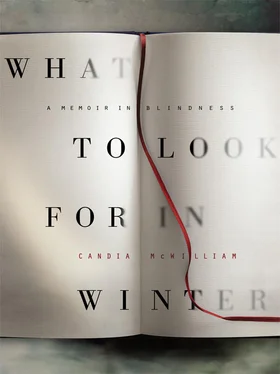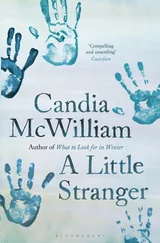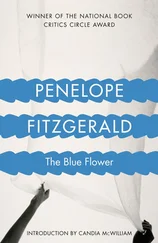We did have one happy day, the day of our Parsi betrothal in Cortona. My mother-in-law had threaded jasmine and marigold ropes and set in shaken chalk auspicious designs all around the perimeter of the house. Fram’s aunt and uncle came from Rome, a coconut was broken and rice placed on our foreheads and sugar on our tongues to make sure that we would only speak sweet words to one another.
The wedding itself took place under the aegis of the Communist Party of Italy. The Mayor of Cortona made us freemen of that beautiful town. We were garlanded with long strings of carnations that my mother-in-law had sewn. We were young, thin, blazingly in love and tremendously close at every possible level. There was a feast at Vasari’s house outside Arezzo, with Italian and Indian food alternating. Fram’s kind and smiling Aunt Khorshed had provided Niazi, her old cook from the Pakistani Embassy in Rome. Yet in the photographs my mother-in-law is holding her sari over her face so that she cannot see what is being enacted before her. If only I could have taken that pain from her and told her that I would look after and love her son for ever, that I could love her, that I was I, not a foreign culture. But it didn’t happen.
Months later, after our honeymoon, the photographs of our wedding came back and Fram noted on a visit home the distaste with which they were regarded. The poison had started to run and could only get worse, most especially when I began to make some small name for myself in that thing, the world.
Mrs Brunner had been simply furious when we got engaged, though it was in a direct and catty way and once she’d said her dreadful piece, we did make friends again. What she said to me was, ‘Go and live with an Indian beside a bus stop in Oxford.’ But in the end she was tremendously chuffed by the next lodger I was able to conjure, up to whom I could not come in any regard, for he was a boy and a handsome one and Mrs Brunner saw at once that here was something greatly more glamorous than I, Edward St Aubyn.
We settled into our flat by the bus stop in the Banbury Road, and I remember Brigid Brophy sending me a postcard saying that to live on the Banbury Road must be much like living in Persepolis. In several regards she can’t have been wrong at all, for I did indeed try hard, and mostly failed miserably, to keep a Parsi house. Even though my mother-in-law chose the sinks and all the sanitary ware and I never cooked onions because Fram hated the smell, I did not keep a Parsi house. My hair moults and Parsis have a horror of dead hair, wrapping it up before throwing it away, as ‘we’ might and ‘they’ certainly do with nail clippings. It was, of course, idiotic to attempt to ape a culture I had not been born into, no matter how open to it I was — and I was. The cracks in a performance, no matter how rounded it be, will declare themselves, through nerves, self-consciousness, or even that sense of falsity that goes with the attempt to imitate, be it never so innocent and good-hearted. How could I, brought up in Edinburgh, gather what had been handed down through thousands of years from the high plains of Yazd and Bam?
The following awful truth is so. My father was expected at our wedding, but mysteriously cancelled. On our wedding night, over dinner in Orvieto, Jamie Fergusson casually let it fall that Daddy was that day having open-heart surgery. Later that night, before retiring, we went for a walk in the town. When Fram saw someone whom he thought attractive, he said so, as he always did. I thought, ‘That’s fine. It’ll all feed back into me.’ Now I think I know that I should have said, ‘It’s our wedding night. Please look at me. I am here.’
I learned these things too late and from Fram’s new companion Claudia, who has only just not got my name. She enacts these things and is in this respect my beneficiary, as well as being someone who knows instinctively how a properly adjusted person should behave.
Having been raised in habits of unassertion, I have learned inadequate systems of self-defence that may seem suspect to outsiders especially when manifested by a person of such size.
There is on the face of Orvieto Cathedral one particular dancing angel, her mood choric, her hair loose, her mouth laughing. I did feel that happy on that first day of our marriage and often thereafter too.
Our honeymoon was short and busy. We drove the elderly white Lancia on which Fram had learned to drive in The Hague fifteen years earlier, when his uncle had been Pakistani Ambassador. You could see the autostrada through the floor. We drove south to Ravello and Amalfi. Lorna Sage had given us Gore Vidal’s telephone number and told us he’d love to hear from us.
Not much he didn’t. At Fram’s amused insistence (maybe he was bored) every day, after caffe latte and for Fram toast and croissants (I was constantly, in those days, starving myself) I would ring the Vidal house and get a very dusty answer indeed. We drove to Pompeii, Herculaneum and very early one morning Paestum where the air smelt of sage and rosemary and our only companions were two ghosts.
The ghosts were tidy and well turned out, clearly having died around the mid nineteen-twenties. Her bob, her filet, his hat, his pince-nez, their faded Baedeker, his ancient plate camera, her button shoes, her clocked silk stockings, his punched co-ordinate brogues, everything chimed. It was years later in England that we realised that they must have been Stephen and Oriel Calloway, doing a spot of rubble-romping.
It was Fram’s first sweet act as a stepfather that our honeymoon lasted only four days because we had to surge up to Rome again and fly home so that we might take the children to be page and bridesmaid at the wedding of our friends Cyril and Natasha Kinsky in Dorset. There was no grumbling at all and I recall, as the dancing began, having a sensation that should not arrive as a form of self-consciousness, since it is an absence of self-consciousness, that I was where I should be, with whom I should be. It was wonderful to be with the children again.
There was from the start something not good for our marriage in the routines that I collaborated with. Because I had never forbidden anyone anything, I encouraged Fram to spend as much time with his mother as he had when he was a bachelor, rationalising that this was an adjustment that I had to make as the junior partner (junior to my mother-in-law) and in deference to her increasing sense of alienation. I was atoning for the Raj, perhaps. I don’t know how. It is interesting that she had a Scottish governess. When she visited Edinburgh, long after we had parted, she said that it could have been somewhere she might have lived and that she wished she had seen it and understood before. This is very sad to address for me.
Her home, or any full concept of that home, had been ruptured by the Partition of India in 1947, the year of her marriage. She and Eddie were first cousins, but his father came from Karachi; hers from Bombay. They had married entirely for love, but the romance had been furthered by their common (Bombay) grandfather. It was an unusually tribal hybrid: a love match that might as well have been arranged. My parents-in-law were everything to each other and regarded their children as extensions of themselves. They began to pity Fram for not, apparently, conforming to their model.
My in-laws’ distaste was certainly not helped when it came to my first entering the world of being published. The Common Reader had all but died out. Publicity was in the ascendant, about to gain a grip even on the then fusty world of publishing.
Such was Mehroo’s charm, and so profound my longing to have a mother figure to love, that I often felt it could have come right, but she was undoubtedly massaged in her nascent, perhaps at the time only half-formed hostility towards me, not remotely by the family in Rome who were steadily loving, but perhaps by others unseen by us. Someone certainly ensured that my poor mother-in-law received every single press cutting referring to me. The sophisticated reader (and my mother-in-law was sophisticated until blinded by emotion) will realise that one has little control over how one is depicted in the press. When my first novel came out, there were a number of photographs of me, none indecent, but very few in my own clothes. I stayed with my in-laws while being photographed by the late (and notably serious-minded and intelligent) Terence Donovan. They were appalled at the stylist’s contrivances when I returned after the shoot. Fram was later given to understand that my painted presence would discomfit his father in his immaculate dressing gown over the breakfast table.
Читать дальше











